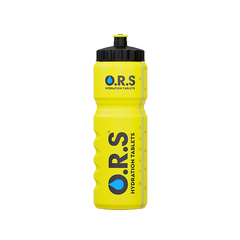What Hydration Challenges Do Older Marathon Runners Face?

The London Marathon 2024 has just taken place, and this year it was memorable for many reasons. A record 53,000 runners crossed the finish line, beating last year’s record of 43,965 by a country mile. A grand total of £67m has been raised for charitable causes, with more funds still to come in.
There was also the usual parade of hardy souls who were running with fridges strapped to their back, dressed as traffic cones, cartoon characters, and a whole range of other weird and wacky outfits.
However, one of the most remarkable achievements was that of David Picklsey, who completed the marathon at the grand old age of 91, and is the only competitor over 90 years of age ever to take part. This is surely inspiring for anyone who is wondering if they have left it too late to embark on a fitness journey!
Another notable achievement was that of Fred Tomlinson, 75, who was proud to take the medal for last place at the alternative finish line. BBC News reports that Tomlinson, of Doncaster, finished the marathon in 13 hours, and crossed the finish line just after midnight.
Tomlinson is a retired police officer, and this year was his 32nd consecutive London marathon. He was running this year to raise money for Rainbow Trust Children’s Charity, which supports children with life threatening or terminal illnesses. This was inspired by the tragic loss of his own daughter Claire, who died just before her 15th birthday.
Slower competitors are supported by a team of 100 tailwalkers, who accompany them for safety reasons as the roads reopen. They also provide moral support and practical help, such as water bottles and rehydration tablets.
Tomlinson commented: "Running 26 miles is absolutely nothing compared to what these children go through. They don't have a choice so it was never an option for me to quit. I'm proud to say I've come last because next year I can only improve on that."
Sean O'Sullivan, one of his helpers, said: "Fred was an absolute inspiration, sharing why he continues to run the marathon, and doing everything with sharp wit, generosity to well-wishers and more grit and determination than I've ever seen at a marathon."
Shreena Kotecha, another member of the support team, added: "We need more volunteers to support the unsung heroes. Fred was incredible and it was really important for me and Team Finish Together to be there to celebrate him."
Dehydration can be a particularly serious issue for older people. As we age, our bodies change and this can make it more difficult to efficiently store fluids and also to recognise the signs of dehydration. Furthermore, when we sweat during intense physical activity we not only lose fluids, but also essential minerals known as electrolytes.
Electrolyte imbalance poses health risks at any age, but in older people they can be particularly acute. Electrolytes are important for muscle function and preventing cramps, which is a common problem for older athletes. They also play a key role in helping the body to rehydrate and retain fluids.
Shone Surendran, 53, crossed the official finish line just before it closed at 7.30pm, and was helped by the tailwalkers. He explained that he experienced five bouts of cramp during the race. He said: "The tailwalkers really held my hand through the last bit, which was an absolute nightmare. I'm immensely grateful, they are the marathon angels to me."
Older runners may not be able to completely prevent the risk of cramp, but looking after hydration and electrolyte levels carefully can help to manage the risk. This is crucial because older kidneys do not function as efficiently as younger ones, and this means that the management of bodily fluids can be slower.
Ideally, the runners should start the hydration process two to four hours before the start of the race, with small regular intakes of water.
Regular rehydration stops should be planned into the race day, and not sacrificed for the sake of trying to meet a personal best. For best practice, the runner should calculate their sweat rate during training sessions so that they have a good idea about how much fluid they need to take on board.
The runner should continue to replenish fluids in the hours after completing the race.

